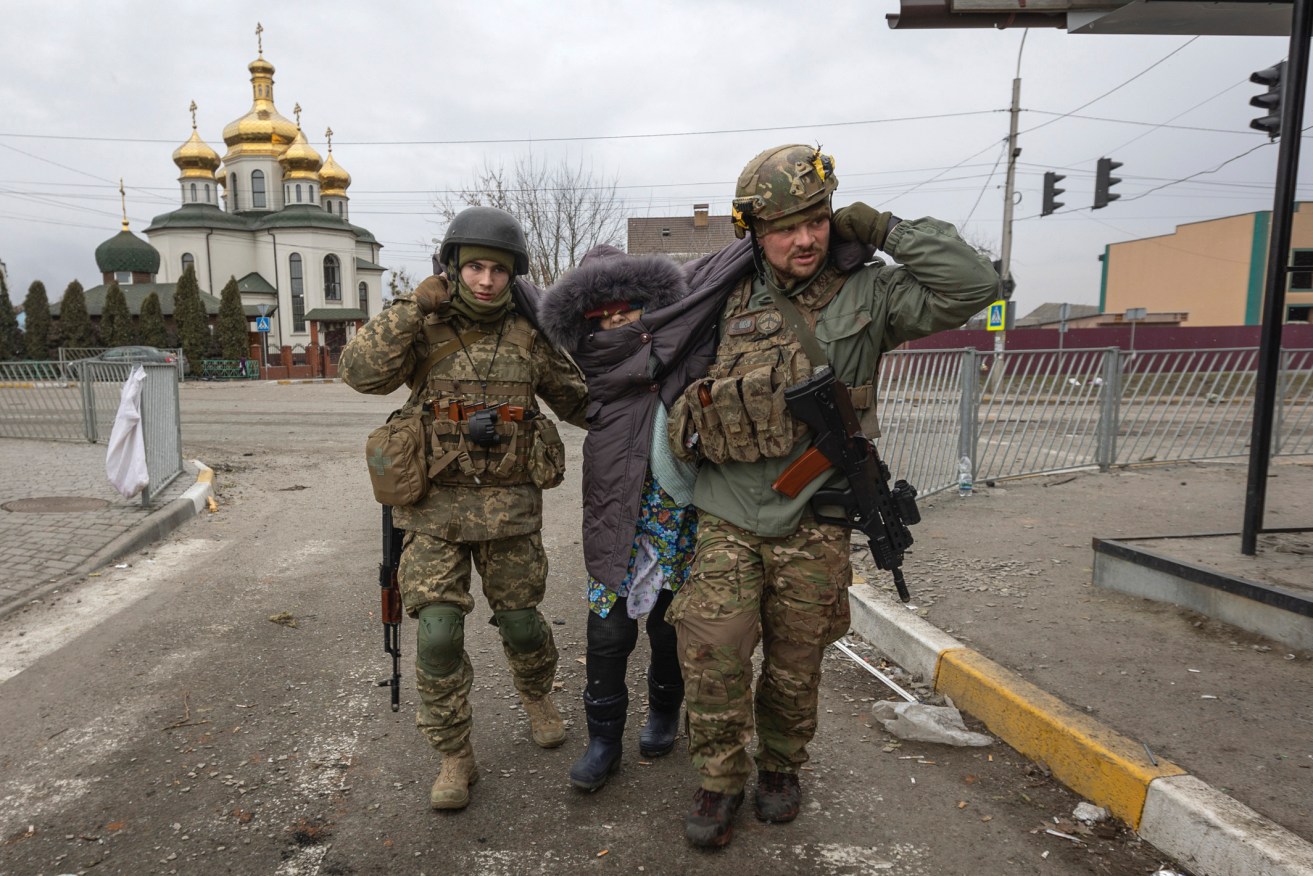‘This is outright terror, from experienced terrorists’ – President
Hundreds of thousands of civilians have remained trapped in Ukrainian cities, sheltering from Russian air raids and shelling as talks between Ukraine and Russia’s foreign ministers made little apparent progress.

Ukrainian servicemen help an elderly woman, in the town of Irpin, Ukraine. (AP Photo/Andriy Dubchak)
With Russian President Vladimir Putin’s war in Ukraine entering its third week, officials in Mariupol said Russian warplanes again bombed the encircled southern port city where a maternity hospital was pulverised on Wednesday.
Ukrainian President Volodymyr Zelenskiy said Ukrainian authorities had managed to evacuate almost 40,000 people from the cities of Sumy, Trostyanets, Krasnopillya, Irpin, Bucha, Hostomel and Izyum, but Deputy Prime Minister Iryna Vereshchuk said no civilians were able to leave Mariupol on Thursday as Russian forces failed to respect a temporary ceasefire to allow evacuations.
Efforts to send food, water and medicine into the city failed when Russian tanks attacked a humanitarian corridor, Zelenskiy said.
“This is outright terror … from experienced terrorists,” he said in a televised address.
Russia’s defence ministry said earlier it would declare a ceasefire on Friday and open humanitarian corridors from Mariupol as well as Kyiv, Sumy, Kharkiv, Mariupol and Chernihiv.
Russia’s invasion of Ukraine has failed to reach its stated objectives, but has caused thousands of deaths and forced more than two million people to flee Ukraine, where several cities are under siege.
It has also hit a global economy that is still emerging from the effects of the coronavirus pandemic.
International Monetary Fund managing director Kristalina Georgieva said the war and the massive sanctions imposed on Russia as punishment had reduced global trade and raised food and energy prices, resulting in a lower global growth forecast.
Putin, facing global condemnation and increasingly isolated, said Russia would emerge stronger after overcoming the difficulties caused by the sanctions.
He told a government meeting there had been no alternative to what Russia calls its special military operation in Ukraine.
Russian Foreign Minister Sergei Lavrov and Ukraine’s Dmytro Kuleba met in Turkey in the highest-level talks since Putin ordered the invasion on February 24.
Kuleba said Lavrov had refused to promise to hold fire to allow aid distribution and the evacuation along humanitarian corridors of civilians trapped in Mariupol and elsewhere.
Lavrov showed no sign of making any concessions, saying the operation was going to plan and repeating Moscow’s accusations that Ukraine posed a threat to Russia, which wants Kyiv to drop any aspirations of joining the NATO alliance.
In Washington, Central Intelligence Agency director William Burns said Putin did not appear to have a “sustainable” end-game in Ukraine and might soon try to find a way to end the fighting.
A senior Ukrainian official said on Thursday that Russian planes bombed an institute in the city of Kharkiv that was home to an experimental nuclear reactor.
Earlier, the UN nuclear watchdog said Ukraine had told it on Thursday it has lost all contact with the radioactive waste facilities at Chernobyl next to the defunct power plant, which is now held by Russian forces.
Aid agencies say humanitarian help is most urgently needed in Mariupol, where residents are running out of food, water and power. Its capture would allow Russia to link pro-Moscow enclaves in the east and Russian-annexed Crimea to the south.
Attempts to send aid and evacuation convoys have failed for six days.
Mariupol mayor Vadym Boychenko said 400,000 people were trapped in the city, which had gone through “two days of hell”.
Lavrov said the hospital struck on Wednesday had stopped treating patients and had been occupied by Ukrainian “radicals”.
Russia’s defence ministry later denied having bombed the hospital, accusing Ukraine of a “staged provocation” there.
White House spokeswoman Jen Psaki called the hospital attack “horrific” and “barbaric”, and said Washington was reviewing Russia’s actions for possible war crimes, following similar remarks by European Commission President Ursula von der Leyen.
Lavrov accused Western countries of inflaming the situation by arming Ukraine.
Russia says its offensive is aimed at disarming its neighbour and dislodging leaders it calls neo-Nazis. Kyiv and its Western allies say this is a baseless pretext to invade a democratic country of 44 million people.












